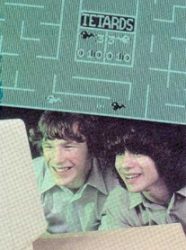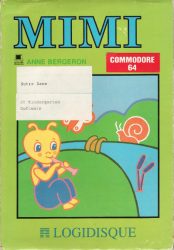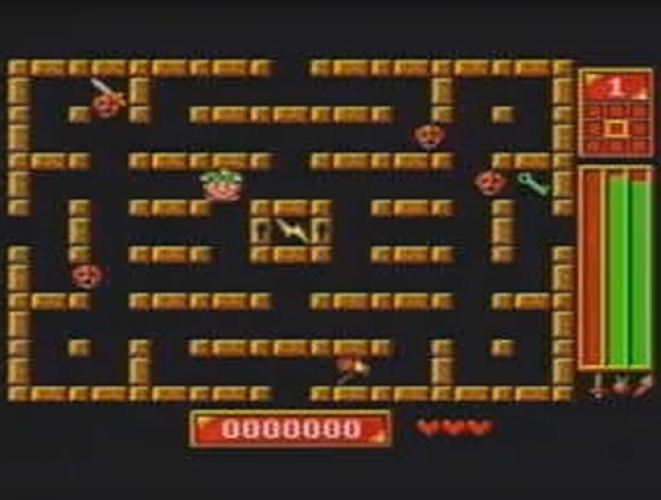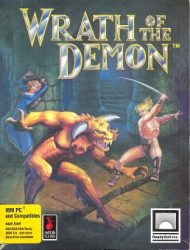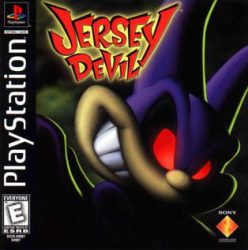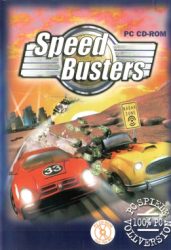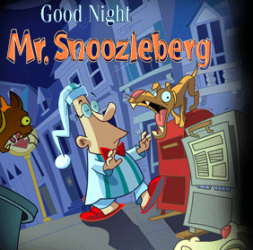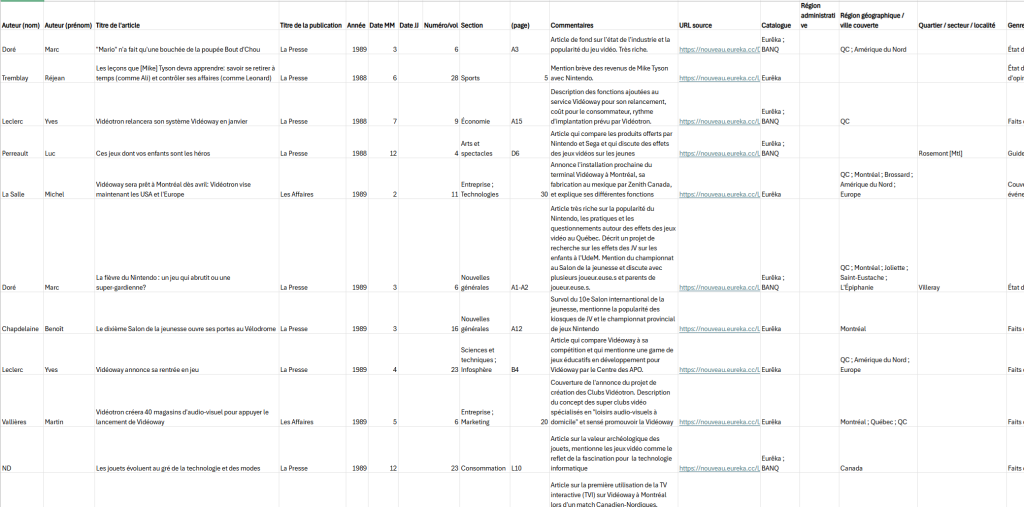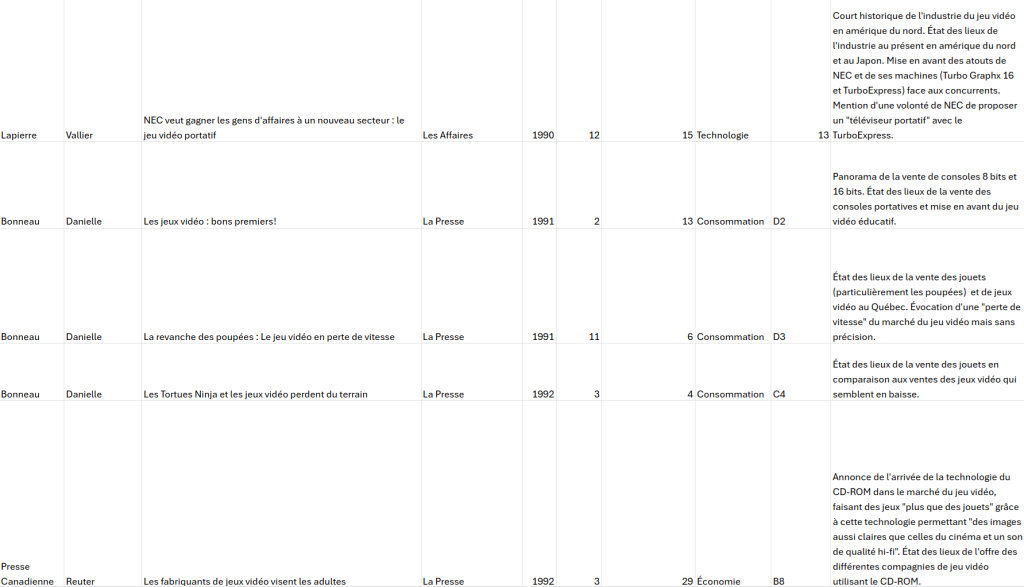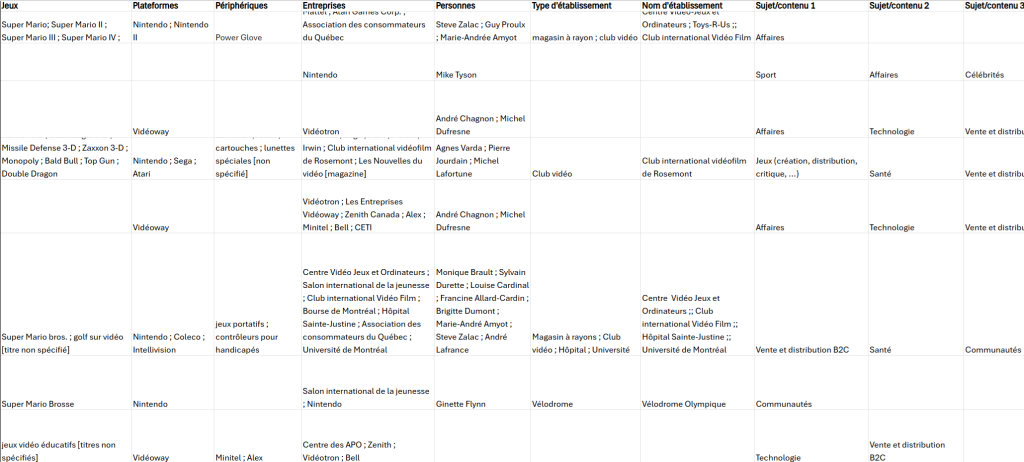Video Games in Quebec
Project overview
1967-2020: Over 50 years of video game history in Quebec
Funded by the Social Sciences and Humanities Research Council of Canada (SSHRC) from 2024 to 2029, this research project aims to produce the first sociocultural history of video games in Quebec. Little has been written on the subject apart from the development of studios, jobs, and successful games. Without neglecting the evolution of the industry, this project aims to give a voice to the ordinary people who, in every region, have brought video game culture to life: parents, children, distributors, journalists, artists, stores, clubs, arcades, LAN parties or television programs, all of which have given shape to video game practices and culture in Quebec.
Led by a team of video game specialists, this research project aims to gather the stories of all those who have lived this history, from the screening of the first interactive film at Montreal’s Expo 67 to the rise of an established industry in Quebec.
Research Team

Dominic Arsenault
Project manager
Interests: scriptwriting, graphics, music

Dany Guay-Bélanger
Coordination
Interests: game preservation, oral history

Cédrik Bergeron-Hamel
Research assistant
Interests: video game temporality, research-creation

Jessica Harvey
Technician – recording
Interests: scriptwriting, research-creation

Francis Lavigne
Laboratory manager
Interests: Quebec culture, critique

Bernard Perron
Project manager
Interests: horror games, cognition, interactive cinema

Michelle Raby
Research assistant
Interests: video game series, music, storytelling

Hugo Remy
Research assistant
Interests: Cinema and video game

Julien Pepperall
Research assistant
Interests: Interactive cinema, branching narratives

Salima Toumi
Coordination assistant
Interests: identity building, posthumanism

Carl Therrien
Project manager
Interests: history of gameplay, CD-ROM

Philippe Dubé
Research assistant
Interests: scriptwriting, independent games, narrative
Project approach and objectives
Despite Quebec and Montreal’s worldwide reputation for video game creation, many chapters of this history have yet to be written. The rapid evolution of digital technologies since the 1970s may lead us to believe that archiving and documentation are sound, but globalisation and the commercialisation of the Internet have erased the specificities of many local cultures, which are now in jeopardy. Digital files and storage media are deteriorating, magazines are being discarded or lost, and the witnesses to this history are aging or leaving us. That’s why our project aims to document, archive, and ultimately preserve the voices of those who have given life to the history of video games in Quebec.
The research covers 4 facets of video game culture in Quebec:
- creation: game development studios, outsourcing services and game publishing ;
- circulation: stores, distributors, events, and organizations;
- reception: by the public, communities, critics, and journalists;
- artifacts: games, their documents, and gameplay archives.
The research mobilises a multidisciplinary approach and a 4-part methodology:
- oral history: semi-directed interviews to collect stories;
- written history: archives of newspapers, magazines, television reporting, reviews, and discussion forums;
- gameplay archiving: by following a technical protocol to preserve play experience;
- game analysis: to identify the characteristics of games created in Quebec and their reception.
The research aims to produce the following results:
- A documentary (or series) presenting the history of video games in Quebec, with excerpts from the interviews;
- A mainstream, accessible book that presents this history, with excerpts from stories and images;
- A museum exhibition of national scope, featuring physical and digital artifacts;
- A video archive of interviews conducted in their entirety, available online;
- A gameplay archive of numerous video games created in Quebec that follows the standards of a protocol developed at UdeM;
- An online database listing mentions of video games in the Quebec press;
- A scientific production of articles and other communications for researchers.
Many of these objectives depend on partnerships with institutions or companies, which have yet to be defined. This page will be updated as discussions progress.
Frame
The project “1967-2020: Over 50 years of video game history in Quebec” is funded by SSHRC (Social Sciences and Humanities Research Council of Canada) from 2024 to 2029. It is led by Bernard Perron (principal investigator), Dominic Arsenault, and Carl Therrien (co-investigators), professors in the Department of Art History, Cinema and Audiovisual Media at the Université de Montréal. All three have been contributing to game studies for 20 years, including a special issue of the Canadian journal Loading on video games in Quebec in 2021.
The project is coordinated by Dany Guay-Bélanger, who is writing a doctoral thesis on the oral history of video games. In addition to research assistants writing master’s theses and doctoral dissertations on video games, the project involves seven collaborators:
- in Quebec: Jonathan Lessard (Concordia University), Diane-Gabrielle Tremblay (Université TÉLUQ), Gabrielle Trépanier-Jobin (Université du Québec à Montréal), and Annaëlle Winand (Université de Montréal);
- internationally: Alexis Blanchet (Université Paris III-Sorbonne-Nouvelle, France), Yannick Rochat (Université de Lausanne, Switzerland), and Nick Webber (Birmingham City University, UK).
Participation in the project, whether in the form of a story or an interview, is subject to a certificate of research ethics issued by the Comité d’éthique de la recherche en arts et humanités de l’Université de Montréal (CERAH #2024-5927).
50 video games from Quebec
The project will archive 50 Quebec video games according to the established lab protocol (see Publications and Resources), in addition to producing game datasheets. This work is ongoing, and this page will be updated in due course. An initial selection of 30 games to be archived and concept sheets can be viewed here.
1980-1989
1990-1999
2000-2009
More Soon
Research
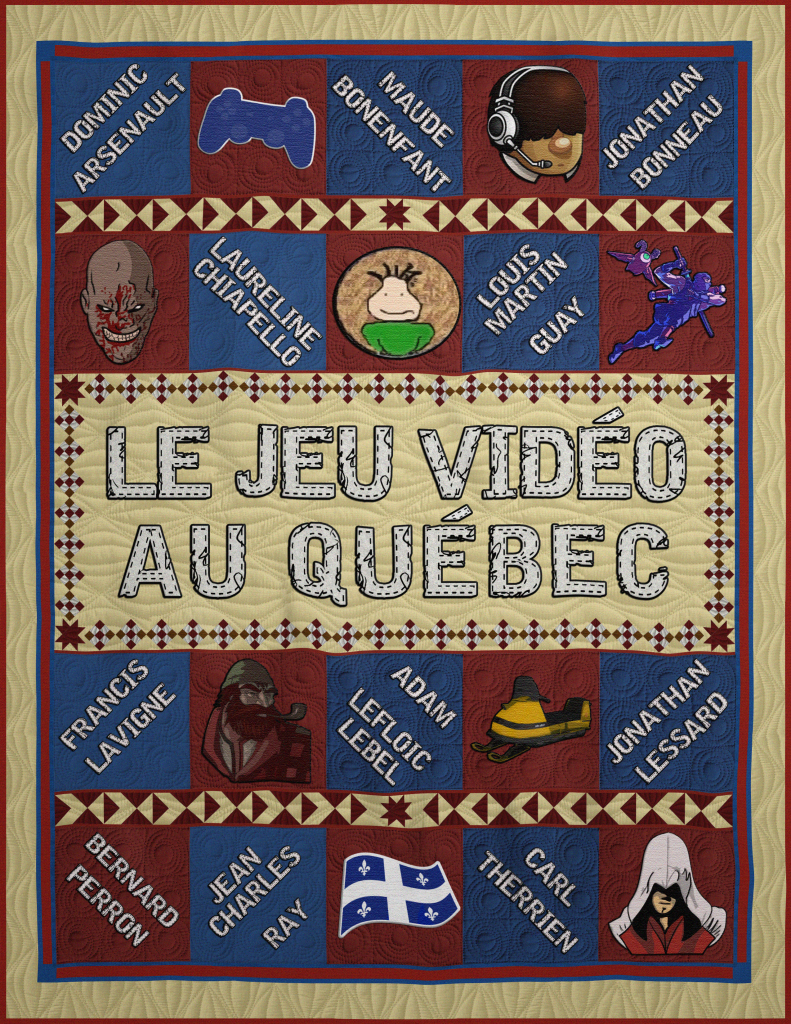
The Video Game in Quebec. Loading… Journal of the Canadian Game Studies Association, vol. 14, no. 23 (2021), edited by Bernard Perron. [Link]
Including:
“Le jeu vidéo au Québec” (Bernard Perron)
“Indies de province: deux développeurs de jeux indépendants dans le Québec d’avant Internet” (Jonathan Lessard and Carl Therrien)
“Exploration, colonisation et développement durable: Portrait en trois temps de l’industrie du jeu vidéo au Québec” (Dominic Arsenault and Louis-Martin Guay)
“Les laboratoires des entreprises vidéoludiques installées au Québec et les partenariats avec l’université: L’exemple de la recherche sur les pratiques de jeu et les communautés de joueur.se.s et l’avenir ouvert par l’intelligence artificielle” (Maude Bonenfant and Jonathan Bonneau)
“La créativité dans l’industrie du jeu vidéo au Québec: un colosse aux pieds d’argile?” (Laureline Chiapello)
“Regarder la peur dans les yeux: La série Outlast dans le renouveau de l’horreur vidéoludique” (Jean-Charles Ray)
“Collectionner les jeux vidéo au Québec: Une communauté naviguant entre société distincte et mondialisation incontournable” (Adam Lefloic-Lebel)
“La culture vidéoludique au Québec: Le besoin d’une histoire du jeu, de ses pratiques et de ses discours” (Francis Lavigne)
“Game(play) Archives: Quebec Video Games as Case Study” (Dany Guay-Bélanger, Maxime Deslongchamps-Gagnon, Francis Lavigne & Bernard Perron. In G|A|M|E. The Italian Journal of Game Studies, no.10 (2023). [Link]
This article presents the philosophy behind our preservation protocol and archival packages in an attempt to stimulate the discussion surrounding game(play) preservation initiated more than a decade ago. These packages consist of audiovisual recordings of play sessions inspired by Longplay videos; game datasheets, which include contextual information on the game being preserved; and digital copies of meta and paratextual documents relating to the game. We also showcase our reflections on the process of assembling a corpus of video games developed in the province of Quebec, Canada for their preservation. These reflections stem from this project’s origin as a pedagogical endeavour as it aimed to help both researchers and students develop good archival practices. To enter the next ten years of game studies, we ought to share our approaches to video game preservation. Without game(play) archives, there are no game(play) studies. The main objective of this project is to create guidelines for gameplay archives and preservation.
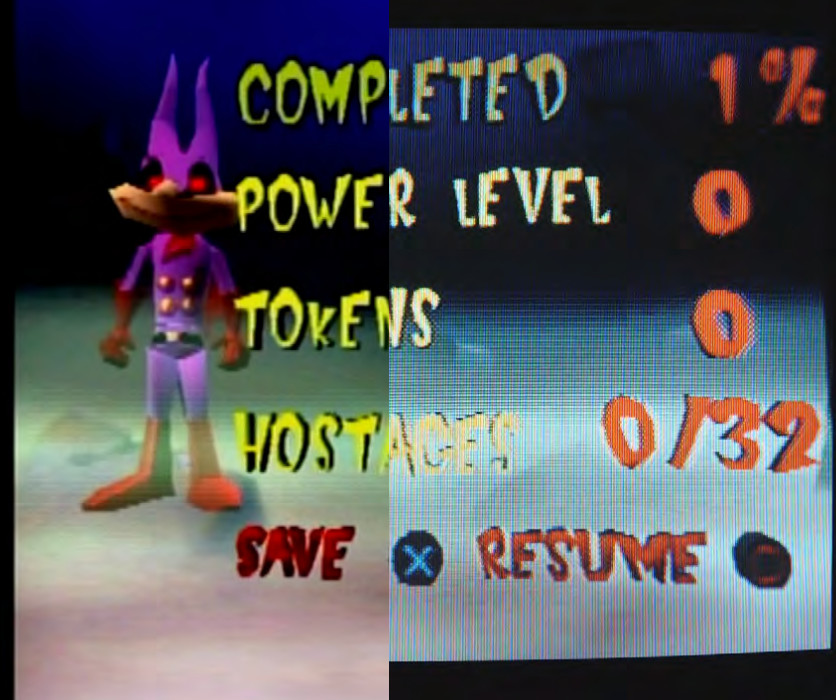
Research files (in French only)
Sang-Froid: Un conte de loups-garous (Sang-Froid: Tales of Werewolves) – Artifice Studio, 2013.
Interview with Yan Pépin.
Kona – Parabole, 2017.
Visual supports, presentation “Petite promenade québéco-intertextuelle dans les bois de KONA” (Bernard Perron et Francis Lavigne), journée d’études LUDOV 2.0, June 13, 2018.
Gameplay archive
There is a significant lack of tools and resources for archiving video games. LUDOV has developed an archiving guide with the aim of cataloguing and preserving the history of Quebec video games.
Guide to archiving the playability of Quebec video games
Use the anonymous connection if you don’t have a user account and don’t want to create one.
List of the first 30 games to be archived
A tab in the section reserved for our collection also allows you to target the video games from Quebec available at the laboratory.
Useful links
La Guilde du Jeu Vidéo du Québec
“Discover an industry that has become a world leader. For more than 30 years, Quebec has been creating world-renowned games.” (La Guilde)
“Discover Quebec video games” (La Guilde du Jeu Vidéo du Québec, in collaboration with the Government of Quebec)
Vidéoludique.ca (French only)
“Vidéoludique.ca” is an independent blog covering the video game industry in Quebec, which is the 5th largest video game industry in the world.” (Mario Jorge Ramos)
The aim of this map is to list the places where video games were sold, played, exchanged, and created over the course of the medium’s history in Quebec.
To add a location, please fill in the form below. Describe the location and share a comment or memory of your experiences. Our team will integrate your suggestion as soon as possible.
This map is powered by OpenStreetMap and uMap, which do not support multilingual maps. You can use any language when filling the form. We will translate factual information (description, category) into French for consistency, but will preserve your story and voice exactly as submitted, and in your language.
We’re working on the first social history of video games in Quebec, and we need your help to write it! Whether you sold, bought, rented or traded, created or programmed video games, presided over a club or participated in a tournament, frequented an arcade or flea market, it’s all part of history and your voice counts. This story will be told through a book, a documentary, a museum exhibit, and a website.
A social history
The history of video games is often told through the lens of the industry and of companies. Led by a team of specialists passionate about video games, this project therefore seeks to document how ordinary people have experienced this medium: your first experiences, who you used to play with and talk to, where you bought or rented games, how you learned about new releases (magazine, TV show, etc.), and much more!
To get involved, just write to us at contact@ludov.ca. Our coordination team will get back to you shortly!
- Map of Quebec: Add a location to the VideoludiQC map: shops, arcades, video clubs, convenience stores, flea markets, etc. Be sure to write a short description of the place and what happened there or a memory related to that place. We want to document every region of Quebec, from the 1970s onwards!
- Comment: Write to us with a story or anecdote about where you’ve been, the places you’ve visited, the events you’ve participated in or your video game practices. Your message can be anonymous, but we’d like to know at least the location (town/neighbourhood, region). A link to a form will be available soon.
- Documents: Write to us and attach files (or links) to objects relating to video games: pictures, drawings, notebooks, pamphlets, advertisements, or announcements of events in a local newspaper, etc. In the case of items that are not in the public domain, we will come to an agreement on permissions for the use of these images. We can also collect and preserve physical objects or documents, if they fit in with the objectives of the project.
- Interview: Do you have a lot to say? Have you witnessed a number of changes in video games or been at the heart of their evolution? Write to us with a brief description of your background and your relationship with video games. We’ll follow up with you to see how we can gather your story: a) in writing; or b) we’ll come to you to record an interview in person.
To find out more
Go to the Home tab for a general presentation of the project, its team members, its objectives, and in which framework this research project is situated.
Documents posted on this site are the property of their respective owners and may be subject to copyright. They are provided for research and educational purposes. If you feel that a document does not meet the standards of fair use under Canadian law, please contact us to request its removal.

